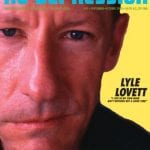James Mathus – Too Late To Be Nervous
Imagine spending your life as an author, publishing well-received but obscure murder mysteries. Then one day, you do some comic books as a lark. It turns out you’re really good at comic books, but it’s just a fun and not-too-serious hobby — until one of those comic books unexpectedly turns up on The New York Times best-seller list, and turns into a massive hit. Suddenly, that quirky little side-project is a full-time job, and the only thing most people know about you. It pays well, though maybe not well enough to compensate for the headaches it engenders. Once it finally runs its course and you go back to writing murder mysteries, you’ve still got some knucklehead asking when that next comic book is coming.
That, or a musical parallel, is what happened to James Mathus over the past decade. He grew up in Mississippi playing blues, then played swampy rockabilly in the band Metal Flake Mother after moving to North Carolina in the early 1990s. But most folks know Mathus as co-leader of Squirrel Nut Zippers, the hot-jazz band that had one of the unlikeliest platinum records ever, thanks to the 1997 MTV hit “Hell”.
By the time the Zippers disbanded earlier this year, Mathus was already well into a solo career with his blues band Knockdown Society. Mathus’ first Knockdown Society album was 1997’s loose-limbed Songs For Rosetta, a benefit for bluesman Charley Patton’s ailing daughter (who was Mathus’ nanny during his formative years in Mississippi). Things got louder with the 2001 follow-up National Antiseptic, and they get louder still with Stop And Let The Devil Ride, released in June on Fast Horse Recordings.
At this rate, Mathus’ Knockdown Society catalogue will soon surpass the five full-length albums the Zippers managed. That can’t happen soon enough, as far as Mathus is concerned.
“I’m just trying to educate people as to what to the hell I’ve been doing,” Mathus says of his recent touring with Knockdown Society. “Every once in a while, somebody will still show up wanting to hear ‘Hell’ or something. But that stops after we go to a town one time, and there’s less and less of that I have to deal with. I try to take it all with a grain of salt. If a promoter wants to say ‘founder of Squirrel Nut Zippers’ or ‘formerly of,’ I say go ahead if they think it will draw people.”
There are Squirrel Nut traces in Knockdown Society, mostly because Mathus’ wry bluesman persona was a key component of the Zippers’ sound. Stop And Let The Devil Ride goes heavy on jam-blues, very much of a piece with Mathus’ kindred spirits and frequent collaborators, the North Mississippi All Stars. All twelve tracks were cut live at Kudzu Ranch, the Mebane, North Carolina, studio owned by Southern Culture On The Skids guitarist Rick Miller. “The band is good and tight, and the sound we’ve got is just what I want — this fierce electric boogie music, Mississippi-style, down to the bone as much as we can,” Mathus says.
Various Zippers have continued to play outside the band, including Mathus’ banjo-playing wife Katherine Whalen (who released a fine album of standards, The Jazz Squad, in 1999). But Mathus has by far the highest solo profile. In addition to the Knockdown Society discs, he played trombone on Jim Dickinson’s 2002 album Free Beer Tomorrow and produced an upcoming album for ailing Mississippi blues singer Jessie Mae Hemphill.
“We arranged for a meeting of all the big musical clans down there,” Mathus says of the latter project. “The Burnsides, Turners, Kimbroughs, Kenny Brown, all the North Mississippi cats. Got about twenty of them together and they called me in to oversee and play guitar, organize the clusterfuck, try to keep shootings from happening.
“But it was actually very peaceful. A lot of these people had not played together for 50 or 60 years, and they had some rivalries. So it was a historical event in North Mississippi music. No rehearsals, everybody just went into this studio set up in an old barn and we rolled tape. It was a high-tech field recording.”
Mathus’ knack for interpersonal diplomacy has also led to an association with Chicago blues great Buddy Guy. They first worked together two years ago on the 2001 album Sweet Tea, a collaboration between Guy and North Mississippi stomp drummer Spam (who plays with T-Model Ford). Mathus’ job was to be “the glue and sparkplug” — he played second guitar, and kept the vibe copasetic during the sessions.
It went well enough that Mathus was brought back for Guy’s new album Blues Singer, an homage to Muddy Waters’ 1963 album Folk Singer (on which Guy played). “There were times when I’d sit there with my mouth hanging open listening to the playbacks,” Mathus admits. “But I just had to focus. You sure don’t wanna screw up when you’re doing something like that.
“But I’ve been playing guitar for so long, and this was my chance to do what I’m supposed to do. My whole time with the Zippers, I felt blessed to get paid to do what I wanted to do. So I’ve put my time in on the damn thing, and it’s too late to be nervous.”




